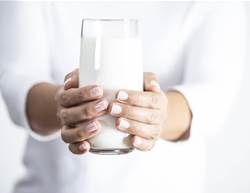Fast forward to adulthood, when I transitioned to unsweetened almond or coconut milk and the occasional jug of skim—unless I'm baking, and then it's whole or buttermilk. I'm not against dairy, I just enjoy the thinness and subtle flavor of nut milks.
But recently, in pursuit of the perfect bowl of porridge (because I was eating it every morning for a month), I gave whole milk another shot. Once I had a taste of how creamy my porridge could be with full-fat dairy, nut milk just didn't cut it. This isn't the '90s anymore, so I knew the extra fat wasn't going to kill me. On the contrary, some studies associate full-fat dairy consumption with less weight gain over time and lower diabetes risk, possibly because the fat keeps you satiated longer, making you less likely to snack on sugary carbs that do lead to weight gain.
All of this is to say that I was starting to come around to whole milk, which is why I decided to swap my nut milk and low-fat dairy products (yoghurt, cheese, sour cream) with the full-fat kind for a month to see what happened. Here's how it went:
I was very careful not to go overboard.
Even though I know fat isn't inherently bad, I was still worried about significantly upping my intake through dairy. Would it cause weight gain, despite the research I've read? Aside from cheese, I don't eat all that much dairy, but making the switch to full-fat products definitely tuned me in to exactly how much I had each day. For example, if I ate porridge with whole milk for breakfast, I'd be less likely to have Greek yoghurt for a snack mid-afternoon and hot chocolate in the evening than I would be if I were using my usual almond milk and low-fat yoghurt.
Everything tasted better—and kept me full for longer.
Not just my morning porridge, but also my smoothies and hot cocoa—so much hot cocoa. I actually found that I used less sugar in my cocoa when I made it with whole milk simply because it was richer, so I let unsweetened cocoa powder and cinnamon lead the way. Even my afternoon yoghurt was more satisfying, both because it was creamier and because it kept my stomach from growling before I left work. Likewise, I was less likely to need a morning snack at my desk when I used whole milk in my porridge.
I missed nut milk in my coffee.
The flavour of almond and coconut milk is what I missed most. I don't use cream in my coffee, but I love a small splash of almond milk in it. And at the coffee shop I always opt for coconut milk over regular in my lattes because I like how it tastes. (But beware; the barista's coconut milk mixture does contain added sugars.) In the name of my experiment I tried to stay away from these non-dairy options when it came to getting my caffeine fix, but it was a challenge. I caved for a coconut milk mocha on a particularly stressful weekday afternoon.
My stomach wasn't so sure about the change.
I've always had gastrointestinal distress—something I've been meaning to see a doctor about—so going all in for this story may not have been the smartest decision on my part. I've eaten dairy my entire life, but this was more than I was used to. Full disclosure: I felt weirdly gassy during my month of full-on full-fat dairy products. Was the bloating related? I can't be completely sure, but it was uncomfortable enough for me to crack on my experiment a few days early and buy a carton of almond milk for normalcy's sake.
The Verdict: Full-fat dairy tastes delicious, but there are definitely pros and cons to eating it all the time. I'm not watching my weight, but for someone trying to lose pounds, this swap could definitely backfire. And then there are lactose sensitivities and intolerances to consider— studies suggest around four per cent of Aussies have trouble digesting lactose, so that could explain my GI troubles when I started drinking less almond milk and more whole milk. I plan to continue using a healthy mix of nut milks, low-fat and full-fat dairy depending on what I'm cooking or drinking, and to pay close attention to how my body feels (though it probably won't have to be too close—gas has a way of, um, speaking up). After all, moderation is key, right?









